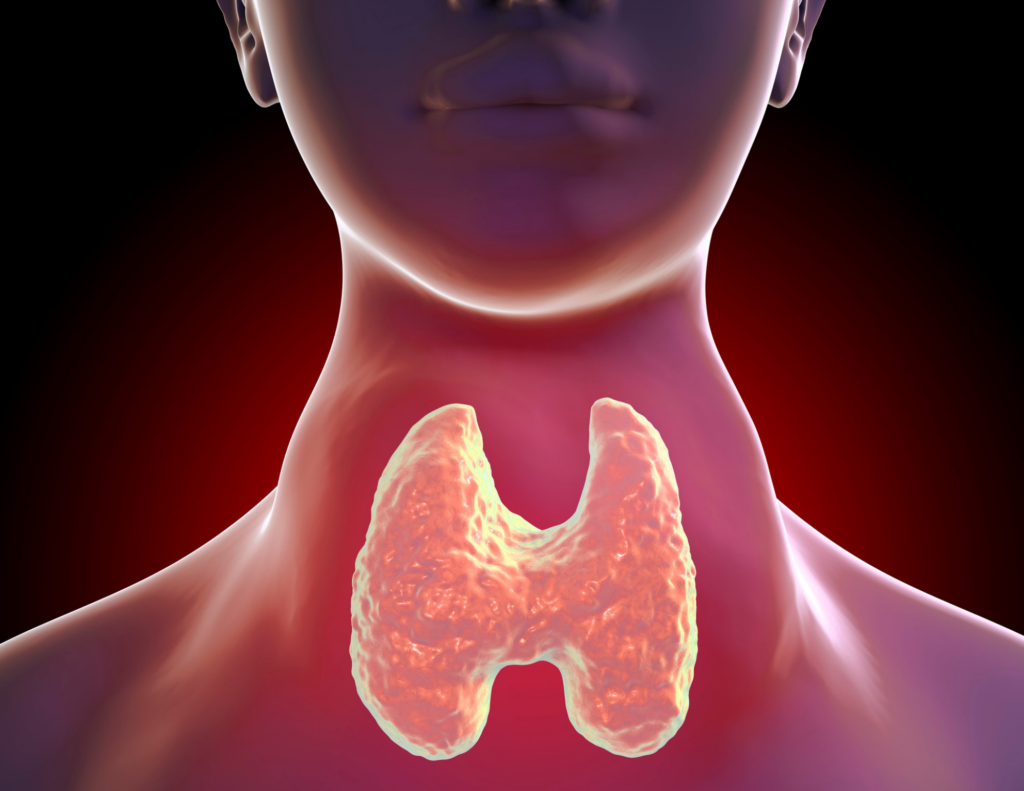Graves’ Disease

Graves' disease is an Autoimmune Disorder that affects the thyroid gland, causing it to become overactive, a condition known as hyperthyroidism. It is one of the most common autoimmune disorders, predominantly affecting women, though men can develop it as well. Conventional treatment often involves medication, radioactive iodine therapy, or surgery, but a holistic approach can play a crucial role in managing the disease, addressing root causes, and improving overall quality of life.¹
Learn more about Functional Medicine vs. Conventional Medicine →
What Is Graves' Disease?
Graves' disease occurs when the immune system mistakenly attacks the thyroid gland, leading to an overproduction of thyroid hormones. These hormones regulate metabolism, energy levels, and numerous bodily functions, so an overproduction can create widespread symptoms, including:
- Increased heart rate or palpitations
- Weight loss despite normal or increased appetite
- Nervousness or irritability
- Tremors in the hands or fingers
- Excessive sweating or heat intolerance
- Bulging eyes (Graves' ophthalmopathy)
- Goiter, an enlarged thyroid gland
The condition is often diagnosed through a combination of physical exams, blood tests (TSH, T3, and T4 levels), and imaging studies.2-3
ARTICLE CONTINUES BELOW
Schedule Your Telehealth Consultation
We would love to sit down with you and chat about your experiences and current health complaints.
Holistic Approach to Managing Graves' Disease
A holistic approach targets lifestyle changes and complementary strategies to support thyroid health, balance the immune system, and reduce inflammation. Below are key pillars of a holistic plan for managing Graves' Disease:
Addressing Nutritional Deficiencies
Optimal nutrition is foundational for managing Graves' disease. Many individuals with the condition have underlying nutrient deficiencies or imbalances that contribute to disease progression. Key nutrients include:
- Selenium: Supports thyroid function and may reduce inflammation associated with autoimmune activity. Rich sources include Brazil nuts, sunflower seeds, and fish.
- Vitamin D: Helps modulate the immune system. Consider testing your vitamin D levels and incorporating foods like fatty fish, egg yolks, or a high-quality supplement.
- Magnesium: Calms the nervous system and supports heart health. Found in leafy greens, nuts, seeds, and whole grains.
- Zinc: Aids in immune regulation. Excellent sources include shellfish, pumpkin seeds, and legumes.
Managing Stress and Its Impact on the Thyroid
Stress plays a significant role in autoimmune diseases, including Graves' disease. Chronic stress can dysregulate the hypothalamic-pituitary-adrenal (HPA) axis, exacerbating thyroid dysfunction. Stress management techniques include:
- Meditation and mindfulness practices: These reduce cortisol levels and improve emotional resilience.
- Yoga: Gentle yoga can reduce inflammation and support parasympathetic nervous system activation.
Deep breathing exercises: Help calm the nervous system and promote relaxation.
Balancing the Immune System
Since Graves' disease is an autoimmune disorder, modulating the immune response is critical.4 Functional Medicine strategies include:
- Gut health optimization: The gut houses 70% of the immune system. Addressing gut dysbiosis and leaky gut through probiotics, prebiotics, and an anti-inflammatory diet can reduce autoimmune activity.
- Autoimmune Protocol (AIP) diet: Eliminating potential triggers like gluten, dairy, soy, and processed foods while focusing on whole, nutrient-dense foods can help manage symptoms.
- Omega-3 fatty acids: Found in fatty fish, flaxseeds, and walnuts, these reduce systemic inflammation.
Supporting Thyroid Health Naturally
Specific herbs and supplements may support thyroid health and overall well-being. However, always consult a healthcare provider before starting any new supplement:
- Bugleweed (Lycopus europaeus): Traditionally used to manage mild hyperthyroid symptoms.
- L-carnitine: May help reduce symptoms like fatigue and muscle weakness.
- Ashwagandha: An adaptogenic herb that supports stress resilience and hormonal balance.
- Anti-inflammatory herbs: Turmeric and ginger can help combat inflammation.
Top 5 Foods to Support Thyroid Health
Diet plays a critical role in thyroid health. Including these five foods in your diet can provide essential nutrients to support thyroid function and overall well-being:
- Seaweed: A rich source of iodine, which is essential for thyroid hormone production. Include varieties like nori, kelp, or dulse in your meals.
- Brazil Nuts: High in selenium, which helps reduce inflammation and supports the conversion of thyroid hormones.
- Fatty Fish: Options like salmon, mackerel, and sardines provide omega-3 fatty acids and vitamin D, both of which support thyroid and immune health.
- Cruciferous Vegetables (Cooked): Broccoli, kale, and cauliflower can support detoxification pathways, but cooking them reduces their goitrogenic effects, making them safe for thyroid health.
- Berries: Packed with antioxidants, they combat oxidative stress and inflammation, which can benefit those with autoimmune conditions.5
Environmental Toxin Reduction
Environmental toxins can act as endocrine disruptors and trigger autoimmune responses. Reduce exposure by:
- Choosing clean personal care products: Free of parabens, phthalates, and synthetic fragrances.
- Using a water filter: To remove chlorine, fluoride, and heavy metals.
- Avoiding BPA and other plastics: Use glass or stainless steel for food and drink storage.
Personalized Lifestyle Modifications
Lifestyle factors play a vital role in managing Graves' disease:
- Prioritize sleep: Aim for 7-9 hours of restorative sleep to support healing and hormone regulation.
- Engage in gentle exercise: Activities like walking, tai chi, or swimming can enhance circulation without overburdening the body.
Stay hydrated: Proper hydration supports detoxification and cellular function.
The Role of Lifestyle Medicine
Lifestyle medicine focuses on empowering individuals to make sustainable changes that support long-term health. For Graves' disease, this includes:
- Developing healthy routines: Incorporating consistent meal times, sleep patterns, and stress management practices can help regulate the body's rhythms.
- Creating an anti-inflammatory environment: From diet to stress management, small daily actions can lower inflammation and improve immune function.
- Building emotional resilience: Emotional well-being is critical to healing, and practices like journaling, therapy, or group support can make a significant difference.
At Back On Track 2 Wellness, we recognize that navigating Graves' disease can be overwhelming. Sometimes, a personalized wellness approach is exactly what you need to move forward on your health journey. Instead of trying to figure it all out on your own, our team can guide you step-by-step, tailoring solutions to meet your unique needs and goals.
Functional Medicine Testing for Graves' Disease
Functional Medicine emphasizes identifying root causes and creating a personalized plan for health optimization. Key tests for Graves' disease include:
- Comprehensive thyroid panel: To assess TSH, T3, T4, and thyroid antibodies.
- Adrenal function testing: To evaluate cortisol rhythm and HPA axis function.
- Micronutrient testing: To identify deficiencies in key vitamins and minerals.
- Comprehensive gut health testing: To uncover dysbiosis, leaky gut, or infections.
Learn more about Functional Lab Ranges vs. Medical Lab Ranges →
The Role of Conventional Medicine
While holistic approaches can significantly improve quality of life, conventional treatments often play a role in managing acute symptoms or severe cases. It is essential to work with both a Functional Medicine practitioner and an endocrinologist to create an integrated care plan.
Takeaway Message
Graves' disease is a complex condition, but with the right approach, it is possible to manage symptoms, address root causes, and live a vibrant life. By combining Functional Medicine principles with conventional care, you can restore balance, support thyroid health, and improve overall well-being. If you’re ready to take a proactive step toward managing Graves' disease, schedule a consultation at Back On Track 2 Wellness today. Our team is here to support you on your journey to optimal health.
Schedule Your Telehealth Consultation
We would love to sit down with you and chat about your experiences and current health complaints.
The information on this website has not been evaluated by the Food & Drug Administration or any other medical body. We do not aim to diagnose, treat, cure or prevent any illness or disease. Information is shared for educational purposes only. You must consult your doctor before acting on any content on this website, especially if you are pregnant, nursing, taking medication, or have a medical condition.

By Dr. Todd W. Bunning
Dr. Todd W. Bunning’s Chiropractic and Functional Medicine services reach far beyond the local Roseville area, with webcam consultations available for patients in any location. With over 21+ years of Private Practice experience, Dr. Todd continues to focus on the individual: science-based methods to address whole-body health factors.
Dr. Todd’s education didn’t stop when he graduated from Life West Chiropractic College in 2003. Today, he’s continuing to receive training and is chipping away on numerous post-graduate degree programs. This unique blend of clinical health investigation and Lifestyle Medicine application helps people of all ages find the underlying factors that result in chronic disease.